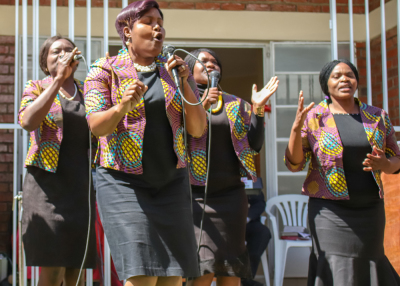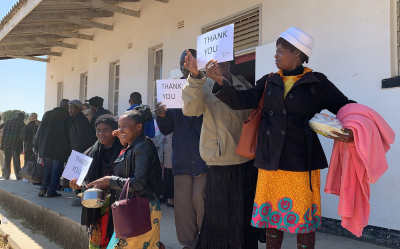 A small ladies ensemble worship in the Ndebele language; singing “Siyabonga, Jesu” at a church service in Bulawayo, Zimbabwe. | Photo: Emma Lown
A small ladies ensemble worship in the Ndebele language; singing “Siyabonga, Jesu” at a church service in Bulawayo, Zimbabwe. | Photo: Emma Lown
I often find myself scrolling through pictures from last month. My heart is filled with joy as I look at the fellowshipping groups, the sporadic worship and the genuine moments, yet I feel a longing. There are some experiences in life you never forget. Although I only spent one week in Zimbabwe, seven days have never impacted me in the way Africa has. My heart for God has been positively altered by the Christian lives in Zimbabwe.
Last month The Tide global radio ministry, a nonprofit organization currently using radio broadcasting and conferences to reach the nations with the Gospel, blessed me with the task of documenting our time in Zimbabwe through journaling. Going to Africa, I knew I had responsibilities to the organization, but Zimbabwe very quickly shifted how I viewed the order of priorities.
As a college student in the United States, I am guilty of falling into a busy routine; when I am given a task I focus fully on what is required. The task-oriented life often results in relationships only being convenient when they fit into the schedule. By contrast, while The Tide ministry hosted a conference during our time in Africa, the Zimbabwean pastors and leaders had scheduled “tea times” throughout each day for the sole purpose of fellowship.
Fellowship naturally flows from the Christians in Zimbabwe in a way I have never seen, and they desperately seek all people to participate in their time together. Each “tea time” we would be sought out and reminded of the time set apart to be with one another. Fellowship is not an afterthought, it is a priority above most else, and the Zimbabwean culture reflects God’s original plan for fellowship. My task-oriented mind travelled with me to Zimbabwe, but the Christians there taught me to leave such a mind behind.
While in Zimbabwe, The Tide team and I were able to attend a local church in Bulawayo. During the service, hands grasped a variety of aged song books—books that were personally owned by each, the pages appeared to have been carefully studied, and the harmonized congregation proved the study of their worship. “Siyabonga, Jesu! Siyabonga, Jesu! Siyabonga, Jesu!” These Ndebele (the native language) lyrics echo in my head as I remember their praise. “Thank you, Jesus! Thank you, Jesus! Thank you, Jesus!”
Exiting church on Sunday morning was not synonymous to leaving the state of worship; all throughout the week, singing was the filler of silence. From seminars to “tea time,” there was singing. From free time to meals, there was singing. If there was extra time, there was singing. Ceaseless worship to God flooded my ears every day, and it changed me.
Worship can become the stalest element among those who believe in Christ; we can fall into a place where we think worship is scheduled, but God created praise to be more than a specific time. The only way I can think to explain the worship experience among the Zimbabwe Christians is sporadic, beautiful and unified. My scheduled worship mind travelled with me to Zimbabwe, but the Christians there taught me to leave such a mind behind.
“Things are a bit tough, but with God we are going to manage,” said the Rev. M. Kalafula, a local Zimbabwean pastor. Life is not easy in Zimbabwe, and I will admit I do not personally understand the struggles they deal with each day. Technology, electricity, water, housing, economy, health—none of these elements are guaranteed in their living, yet the people I saw in Zimbabwe responded with unified worship proclaiming, “God is good!”
 Zimbabwean church leaders and pastors say “thank you” to The Tide ministry for its work in spreading the Gospel and teaching the Bible. | Photo: Hannah Wheeler
Zimbabwean church leaders and pastors say “thank you” to The Tide ministry for its work in spreading the Gospel and teaching the Bible. | Photo: Hannah Wheeler
I am unable to give identity to simply one source for quoting “God is good” in my six days there; I heard countless people communicating this truth. During my time in Zimbabwe, the local bishop, Bishop Sindah Ngulube, was attending his mother’s funeral, yet he and his wife joined our team for dinner to welcome us with “open arms.” There was pain from the recent loss of his mother’s life, but Bishop Ngulube radiated peace; he was in church the next morning as the song lyrics rang “Siyabonga, Jesu! Siyabonga, Jesu! Siyabonga, Jesu!” Life is not set on a consistent schedule, but as Rev. Kalafula says, “…with God we are going to manage.” My mind dependent on consistency travelled with me to Zimbabwe, but the Christians there taught me to leave such a mind behind.
Before leaving Africa to come home, I felt conflicted. I do not want to treat this trip as a trophy on my “shelf of Christian accomplishments.” The people in Zimbabwe are not mere projects; as The Tide team taught them, the Christianity culture in Zimbabwe taught me. In college, I have no choice but to live in my own culture, but I do have a choice to respect the culture to which I have been introduced. But how do I respect a culture I am not currently living in? I wrote these words in my journal a few days before heading home: “This trip to Zimbabwe has called me out of my zone of comfort. I pray I will continue to walk through ‘doors’ leading out of my comfort zone and into being a disciple for Christ.”
God is being glorified in Zimbabwe! We need to thank God for the beautiful people worshipping him in diverse cultures. I am thankful to the followers of Christ in Zimbabwe; they have influenced the mind I brought to them last month. I came with a task-oriented, scheduled worship and consistency-dependent mind, but the Christians there taught me to leave such minds behind.
Hannah Wheeler, originally from Florida, is an editor and reporter for Lancaster Bible College’s only campus newspaper. She is a sophomore majoring in communication and minoring in intercultural studies, and hopes to use her passion for writing, speaking and other cultures in the future. The Tide ministry currently offers audio programming in 25 heart languages spoken by millions of people in multiple regions of Albania, Bhutan, India, Kosovo, Nepal, Nigeria, Thailand and Zimbabwe, making it possible for multiple people groups to hear the Gospel in the languages they were born to speak.

